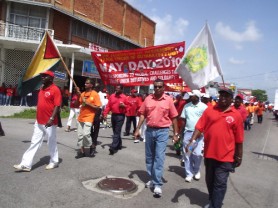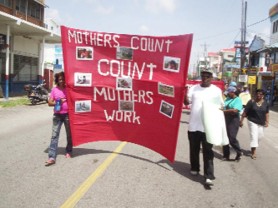May Day has become a bearable irritant, the presence of red-shirted workers on the traditional Labour Day March indicative of a sentimental attachment to a time-worn tradition rather than to any inherent belief in the dictum that the union makes us strong. Worker faith in the power of the union has long dissolved in the mist of what, surely, is a condition of near collapse of trade unionism itself. In a sense, May Day itself, characterized these days by strife and separateness, has become the most poignant symbol of what now passes for trade unionism. The now meaningless May Day rhetoric that passes for rallying calls to wholly indifferent audiences, the farcical invocation of the spirit of Critchlow no longer conceals the fact that labour now languishes in a condition of disarray.
From the podium of the Federation of Independent Trade Unions of Guyana (FITUG), the singular symbol of the division that currently ravages the labour movement, its President, Carvil Duncan, actually had to gall to call for reconciliation. No wonder the assembled workers were inattentive. Duncan is himself a former President of the Guyana Trades Union Congress (GTUC). He presided during a period when charges of a cabal that conspired to prevent the Guyana Agricultural Workers Union (GAWU) from securing high office inside the GTUC were rife. Both Duncan’s union, the Guyana Labour Union, previously closely aligned to the opposition People’s National Congress (PNC) and GAWU, the industrial arm of the People’s Progressive Party (PPP) are now members of FITUG. Perhaps, understandably, the nation’s workers have grown tired of the sterile politics of labour, which, if the truth be told, is responsive to considerations that have nothing to do with their welfare.

A persuasive argument can be made for the complete irrelevance of contemporary labour; not because trade union representation is not, itself critical to the upholding of workers’ rights but because the vast majority – perhaps as much as 75 per cent – of the country’s workers remain un-unionized and, from all appearances, have no real desire to be part of what now passes for a labour movement. Workers need the labour movement but its current manifestation has sorry little to offer.
President of the now crippled Guyana Trades Union Congress (GTUC) Gillian Burton found room in her May Day address to ‘the other’ rally to articulate an essential truth about the movement. Labour, she declared, “is dying.” That may be a dire assessment of the state of the movement; more relevant, however, is its closeness to the truth. Burton’s point about the complete irrelevance of the prevailing labour agenda to the concerns of the contemporary generation of workers amounts to a pointed concession that the trade union movement has simply failed to reinvent itself, to raise its game beyond a culture that has become steeped in mostly confrontational ‘negotiations’ with employers. Not that Burton was suggesting that the ‘struggle’ for workers rights must cease to be a part of that agenda; what she appeared to be implying, however, is that times have changed and that labour has simply been left behind.

This year, the state-run Guyana Chronicle correctly conceded that fewer workers turned out for the May Day event but appeared to miss altogether the point that the calls for trade union unity that resonated in all of the speeches had a hollow ring to them. The current division, the lack of unity is a political doing, engineered by factions nurtured over time within the labour movement itself and, inevitably, exploited by the political powers that be, and the respective groups of workers who attended the separate rallies appear, for the time being at least, to have settled quietly for a status quo that leaves them without any real labour leadership. The consequences though, in terms of an increasingly disillusioned and disinterested work force, particularly in the state sector, is clear for all to see.

It is fashionable and not altogether incorrect the blame politics for the demise of labour. Much of the blame for its condition, however, must be heaped at the door of labour itself and, more particularly, at the doors of labour leaders, some of whose efforts, for a quarter of a century or more, have been focused much more on perpetuating themselves in office rather than on securing gains for the workers. Burton’s point about the absence of empathy between labour and “our youths” was a thinly veiled attack on an anachronistic leadership, key members of which have held power – some in defiance of their own constitutions – for more than a quarter of a century mostly by closing the legitimate doors to succession by younger, better-informed union members. It is no accident, for example, that the once thriving youth movement within the GTUC is now non-existent. The last occasion, more than decade ago, on which an attempt was made to rekindle youth interest in labour, that initiative was summarily killed off by labour elders, clearly worried about the implications of a second tier of leadership for their own entrenched positions. Women too have been marginalized within labour and if, like I have, you speak with Burton, she will probably agree to tell the story of her own struggle to lead a movement whose track record suggests a studied refusal to depart from its male-dominated leadership tradition.
The GTUC has paid a high price for its shortcomings. Structurally, it has been decimated, the remnants of its Secretariat now operational only at the level of occasional media releases and press conferences and embarrassingly small-numbered public protests to which few people any longer pay serious attention. The rest of the labour movement comprises mostly tiny groupings whose small numbers continue to raise questions about their legitimacy as trade unions and the breakaway group, FITUG whose purpose in the context of of the protection of workers rights is decidedly unclear.

Little wonder that when you speak with workers, unionized and non-unionized, slogans like turncoats and sellouts resonate. There is a widespread feeling that the leaders of some of country’s trade unions have used their offices to embellish themselves, materially while others have simply been content to continue to seek to render themselves relevant by periodically making militant-sounding noises designed to do no more than massage their egos and keep themselves in the public limelight. Whether it accepts it or not, labour has become a near-invisible sideshow in the broader national agenda with issues like the current confrontation between the diminished and embattled Guyana Bauxite and General Workers Union (GB&GWU) and the bauxite company RUSAL demonstrating the paucity of the role that trade unions are playing in the national industrial relations arena.
These days, it is employers’ organizations, much more than trade unions, that are trumpeting the cause of workers. Private sector concepts like good corporate governance and corporate social responsibility claim a concern with workers rights, though the record of local private sector entities in areas such as safety and health, wages and salaries and the remittance of workers’ NIS contributions suggests the workers need much more than seemingly benevolent private sector slogans if their rights arte to be properly protected. They need strong, informed unions seized of their vocation to protect the rights of workers.
In some respects it is much the same with the public sector. Apart from the fact that wage and salary increases have long been reduced to the status of state handouts, despite the occasional noises made by the Guyana Public Service Union, the persistent claims by the Labour Ministry regarding its concern for safety and health at the workplace contrasts sharply with the woeful working conditions at some government ministries.
At this year’s FITUG Rally, GAWU’s long standing President and PPP/C parliamentarian Komal Chand called for new strategies to address changing needs. Chan says that failing efforts to address a mending of fences between the GTUC and FITUG there is need to broker a merger between the two factions. In essence, what Chand is advocating is a virtual starting over process, an attempt to put together again a broken trade union movement in a manner that rearranges the balance of power to afford his own union a more prominent place at the table. Chand’s point, though understandable, perhaps ignores the fact that the division within labour has now become far too entrenched to allow for any easy mending of fences. The truth is that –at least in the short to medium term – there appears to be no realistic hope for the salvaging of the labour movement.










